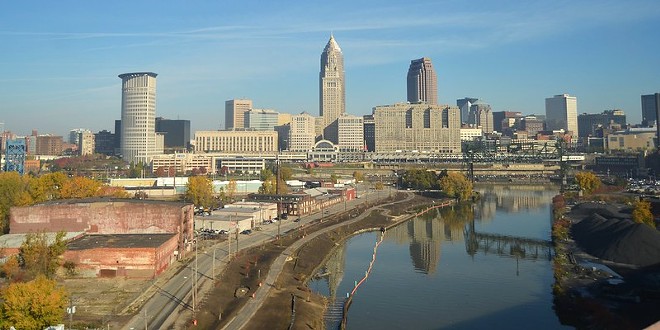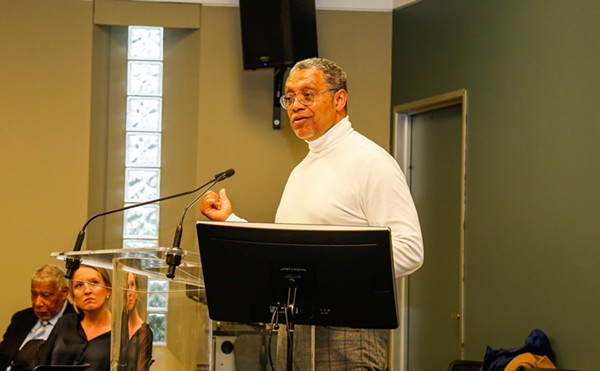Op-Ed: Public Banking Can Help Cleveland Reinvest In Itself
By Geeta Minocha on Thu, Apr 1, 2021 at 12:50 pm
[
{
"name": "Ad - NativeInline - Injected",
"component": "38482495",
"insertPoint": "3",
"requiredCountToDisplay": "5"
},{
"name": "Real 1 Player (r2) - Inline",
"component": "38482494",
"insertPoint": "2/3",
"requiredCountToDisplay": "9"
}
]
Bob Hope, one of Cleveland’s greatest sons, once quipped, “A bank is a place that will lend you money if you can prove that you don’t need it.” In this one-liner is a kernel of truth, one that Cleveland must contend with as it heads into its pivotal mayoral election this year: It’s expensive to be poor.
Approximately 25% of Cleveland residents are unbanked or underbanked, preventing them from accessing credit, building wealth, or taking full advantage of social programs like TANF or Medicaid. Disconnecting people from the financial system makes them more vulnerable to predatory practices, making this issue especially salient for a city that is no stranger to reverse redlining.
Public banking is the answer.
Public banks are municipal, state, or federally owned financial institutions maintained through taxpayer dollars. In local contexts, this allows them to act as convenient depositories for government dollars and to leverage traditional financial services in a way that meets the community’s unique needs. Importantly, public banks can offer low-cost bank accounts and financial services to those who otherwise wouldn’t have access to them, either by directly delivering these services or by making it financially feasible for private banks to do so.
In addition to uplifting the poor, a public bank would allow Cleveland to finance important community projects— housing, road repairs, parks, etc.— without using external institutions as middlemen. The municipal government would face lower interest rates and eliminate third-party fees, saving taxpayers money. Moreover, all profits made on public banking services are reinvested back into the community, leading to a lower tax burden on residents in the long term.
Policy dreams often turn to dust without the support of Cleveland’s business community. But public banking offers a much-needed lifeline to city businesses and entrepreneurs in the form of cheap, accessible loans. A recent pre-pandemic report from the Federal Reserve Bank of Cleveland indicated that, if forced to go over two months without revenue, 86% of small businesses would have to obtain some sort of financial supplement. Ohio has long since reopened businesses, but the pandemic has made clear the uncertainties that small business owners face. Before future disaster strikes, it is worth considering how credit options can be expanded for these individuals.
Rampant inequality has been steadily increasing in communities across the United States since 1970, and the situation in Cleveland is no different. The coronavirus pandemic has only elevated the financial insecurities and troubles of the city’s indigent. Yet with this economic trauma comes an opportunity for Cleveland to show up for its most disadvantaged citizens, encourage small business growth, and lead the nation in innovative policy solutions. “It is what it is” can no longer fly— it’s time to meet the moment and form a public bank.
Approximately 25% of Cleveland residents are unbanked or underbanked, preventing them from accessing credit, building wealth, or taking full advantage of social programs like TANF or Medicaid. Disconnecting people from the financial system makes them more vulnerable to predatory practices, making this issue especially salient for a city that is no stranger to reverse redlining.
Public banking is the answer.
Public banks are municipal, state, or federally owned financial institutions maintained through taxpayer dollars. In local contexts, this allows them to act as convenient depositories for government dollars and to leverage traditional financial services in a way that meets the community’s unique needs. Importantly, public banks can offer low-cost bank accounts and financial services to those who otherwise wouldn’t have access to them, either by directly delivering these services or by making it financially feasible for private banks to do so.
In addition to uplifting the poor, a public bank would allow Cleveland to finance important community projects— housing, road repairs, parks, etc.— without using external institutions as middlemen. The municipal government would face lower interest rates and eliminate third-party fees, saving taxpayers money. Moreover, all profits made on public banking services are reinvested back into the community, leading to a lower tax burden on residents in the long term.
Policy dreams often turn to dust without the support of Cleveland’s business community. But public banking offers a much-needed lifeline to city businesses and entrepreneurs in the form of cheap, accessible loans. A recent pre-pandemic report from the Federal Reserve Bank of Cleveland indicated that, if forced to go over two months without revenue, 86% of small businesses would have to obtain some sort of financial supplement. Ohio has long since reopened businesses, but the pandemic has made clear the uncertainties that small business owners face. Before future disaster strikes, it is worth considering how credit options can be expanded for these individuals.
Rampant inequality has been steadily increasing in communities across the United States since 1970, and the situation in Cleveland is no different. The coronavirus pandemic has only elevated the financial insecurities and troubles of the city’s indigent. Yet with this economic trauma comes an opportunity for Cleveland to show up for its most disadvantaged citizens, encourage small business growth, and lead the nation in innovative policy solutions. “It is what it is” can no longer fly— it’s time to meet the moment and form a public bank.
SCENE Supporters make it possible to tell the Cleveland stories you won’t find elsewhere.
Become a supporter today.
Scroll to read more Cleveland News articles
Newsletters
Join Cleveland Scene Newsletters
Subscribe now to get the latest news delivered right to your inbox.













